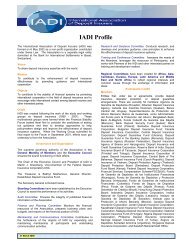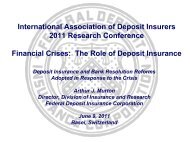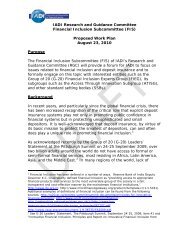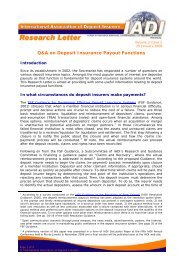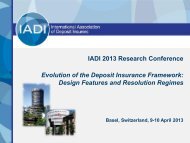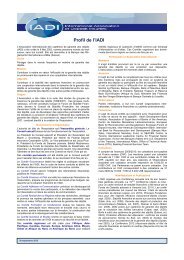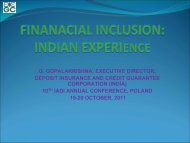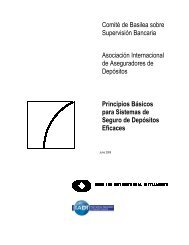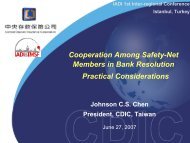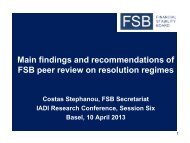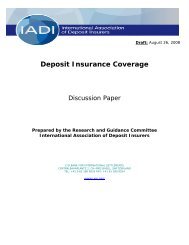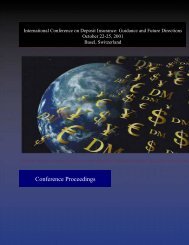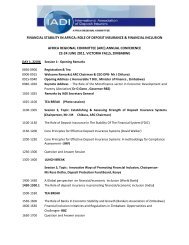Volume II - PDF - International Association of Deposit Insurers
Volume II - PDF - International Association of Deposit Insurers
Volume II - PDF - International Association of Deposit Insurers
- No tags were found...
Create successful ePaper yourself
Turn your PDF publications into a flip-book with our unique Google optimized e-Paper software.
•BACKGROUND DOCUMENTS•<br />
Part <strong>II</strong>: Outreach<br />
insurance to mainstream medicine, implicit guarantees<br />
to alternative medicine, market discipline to<br />
natural healing, and forbearance to faith healing.<br />
Mr. Bliss noted that the first issue paper laid out<br />
public policy objectives very well. The two papers’<br />
stated mandate to provide guidance on deposit<br />
insurance immediately raised a question as to<br />
whether implicit insurance might sometimes be<br />
optimal and referred to Pr<strong>of</strong>essor Edward Kane’s<br />
suggestion that the ambiguity associated with<br />
implicit coverage increased market discipline. He<br />
also pointed to The World Bank’s research on<br />
implicit coverage and the success <strong>of</strong> Canada’s<br />
implicit guarantees during the Great Depression.<br />
He asked whether introducing deposit insurance<br />
in some circumstances—for example, where legal,<br />
regulatory and accounting systems were underdeveloped—could<br />
do more harm than good. He<br />
raised the issue <strong>of</strong> minimum necessary standards<br />
for the legal, accounting and supervisory framework<br />
before deposit insurance could be effective.<br />
He pointed to ‘s empirical findings that lower<br />
coverage limits, coinsurance, private involvement<br />
in funding and management, and covering foreign<br />
deposits, appeared to improve market discipline.<br />
Lastly, he suggested that subsequent versions <strong>of</strong><br />
the papers pay more attention to market discipline<br />
and to implicit guarantees.<br />
In their responses to the discussants’ comments,<br />
Mr. Cowper observed that the Working Group’s<br />
mandate confined it to studying explicit systems <strong>of</strong><br />
deposit protection and Dr. Jaime referred to his<br />
country, Argentina, as a long-term “laboratory” for<br />
deposit insurance experiments.<br />
In the question and answer period, Pr<strong>of</strong>essor<br />
Thomas Mondschean <strong>of</strong> De Paul University<br />
observed that the papers neglected questions relating<br />
to insuring state-owned banks and pointed to<br />
difficulties experienced by Poland in resolving this<br />
issue. Mr. Sabourin responded that issues relating<br />
to state-owned banks would be covered in a later<br />
paper. Another questioner pointed to the difficulties<br />
experienced by Hong Kong, Malaysia and<br />
Thailand when Japan withdrew the funds it had<br />
lent to these and other countries and on which<br />
they relied. In response, Mr. Sabourin stated that<br />
the issue <strong>of</strong> insuring foreign banks was, in fact,<br />
dealt with in the situational analysis paper.<br />
Mr. Tannenbaum pointed to a lack <strong>of</strong> enthusiasm<br />
by the Federal Reserve for his branch bank’s<br />
contingency plans to support its Dutch parent<br />
during the recent period <strong>of</strong> market instability.<br />
Mr. Eisenbeis called for an examination <strong>of</strong> the key<br />
elements that would lead a country to chose one<br />
path for deposit protection rather than another.<br />
He expressed some frustration with the statement<br />
that the Working Group’s mandate confined it to<br />
giving guidance only on explicit systems <strong>of</strong> deposit<br />
protection and prevented it from examining the<br />
alternatives. He said that this was like advising<br />
someone, who had declared his intention to commit<br />
suicide, how best to hold the gun. At this, the<br />
moderator said it was time for the c<strong>of</strong>fee break!<br />
Panel <strong>II</strong>: Issues in<br />
Implementing <strong>Deposit</strong><br />
Insurance Systems<br />
Mr. John Raymond LaBrosse, moderator <strong>of</strong> Panel<br />
<strong>II</strong> and Director <strong>of</strong> <strong>International</strong> Affairs at CDIC,<br />
provided the context for the next two papers that<br />
were discussed. He observed that the Working<br />
Group looked forward to receiving input from<br />
the academic community on the day’s papers,<br />
which were important because they addressed the<br />
four main policy issues facing deposit insurers. He<br />
complimented the next speaker—Mr. George<br />
Hanc, Associate Director at the U.S. Federal <strong>Deposit</strong><br />
Insurance Corporation (FDIC)—on leading the<br />
Working Group’s research effort. He also introduced<br />
Carlos Isoard, Member <strong>of</strong> the Board <strong>of</strong><br />
Directors <strong>of</strong> Mexico’s Instituto para la Proteccion al<br />
Ahorro Bancario (IPAB); and the three discussants—<br />
Dr. Robert Eisenbeis, Director <strong>of</strong> Research at the<br />
Federal Reserve Bank <strong>of</strong> Atlanta; Pr<strong>of</strong>essor George<br />
Kaufman <strong>of</strong> Loyola University Chicago; and<br />
Pr<strong>of</strong>essor George Pennacchi <strong>of</strong> the University <strong>of</strong><br />
Illinois at Urbana-Champaign.<br />
167<br />
Guidance for Developing Effective <strong>Deposit</strong> Insurance Systems: <strong>Volume</strong> <strong>II</strong>



